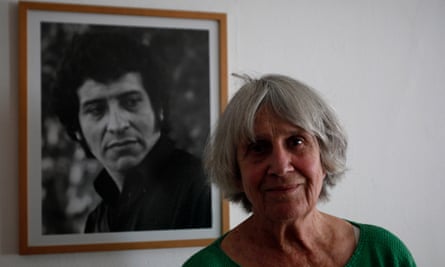One of the most emblematic human rights cases of Gen Augusto Pinochet’s bloody dictatorship is inching towards a conclusion, with the extradition from the US of a former soldier charged with the kidnapping and murder of folk singer Víctor Jara.
Late on Friday afternoon, a plane from Miami landed in Santiago with Pedro Barrientos aboard. Accompanied by a Chilean police escort, the former lieutenant was transferred to a helicopter and flown across the capital for processing at a police barracks.
“We want to draw a line under this case – and quickly,” said human rights lawyer Nelson Caucoto, who has represented the Jara family since 1998.
“Would anyone ever have thought that there would be justice for Víctor Jara?” he asked. “Of course not, only a decade ago nobody would have thought it possible. So in that sense, justice is being served.”
But activists warned that the pursuit of justice must continue unabated, as many of those accused of dictatorship-era atrocities continue to elude punishment.
Fourteen people who have been convicted by Chile’s supreme court of human rights abuses – including extrajudicial executions and kidnapping – remain at large, including two people found guilty in relation to Jara’s kidnapping and murder, according to Caucoto’s legal practice.
“In general terms, Chile still has a huge debt to pay in terms of justice for the forced disappearances, execution and torture [committed under the Pinochet regime],” said Rodrigo Bustos, the executive director of Amnesty International in Chile.
To date, convictions have only been secured in about one third of the 3,216 cases of forced disappearances and executions committed during the dictatorship, according to data compiled by Diego Portales University’s transitional justice observatory.
Just 0.6% of surviving dictatorship-era victims have seen their cases end in a conviction.
“Justice that comes so late is also a denial of justice,” said Bustos. “However, it is vital that these cases do not end in impunity if we are going to build a country in which these crimes are not repeated.”
Jara’s widow, British dancer and activist Joan Jara, died earlier this month at the age of 96 having campaigned for justice for nearly five decades. The first case she put forward in 1978 was closed within a year.
Not long after Pinochet was arrested in London in 1998, Joan showed up unannounced at Caucoto’s Santiago office to ask him to pursue justice for her late husband.
Caucoto remembers feeling a “tremendous responsibility” as he agreed to take the case on, at a time when fresh evidence was hard to come by and witnesses still tight-lipped.
Yet thanks to Joan’s perseverance, testimony from former conscripts, soldiers and prisoners was gradually gathered, eventually allowing the case to be reopened.

Jara, a folk-singer and theatre director, remains one of the best-known victims of Pinochet’s coup d’état. His protest songs remain popular today.
After his arrest on 12 September 1973, he was transferred to Estadio Chile, a small indoor stadium in downtown Santiago which became a makeshift detention centre for supporters and allies of socialist President Salvador Allende.
He was recognised by guards and separated from his fellow prisoners along with Littré Quiroga, who had served as the director of Chile’s prison service in Allende’s government.
Jara was interrogated and tortured in the changing rooms in the bowels of the stadium, where his hands were broken and skull battered with the butt of a rifle.
According to testimony belatedly provided by José Paredes, then an 18-year-old conscript, Barrientos played Russian roulette with Jara before shooting him dead on 16 September 1973.
Paredes and the other conscripts were ordered to fire flurries of rifle rounds into Jara’s body which was later dumped near Santiago’s main cemetery. An autopsy revealed at least 44 bullet wounds and 56 fractures.
Another former soldier, José Navarrete, testified that, in the years after the murder, Barrientos had the habit of brandishing his pistol and declaring “I killed Víctor Jara with this!”
Barrientos fled Chile in 1989 and settled in the US a year later, where he married a US national, gaining citizenship.
In 2012, a judge in Santiago charged Barrientos for the kidnapping and murders of Jara and Quiroga, and Chile sought his extradition.
Four years later the jury in a civil suit brought in Orland ruled that Barrientos was “responsible” for Jara’s kidnapping and murder, ordering that he pay $28m to the singer’s family.
In July, a federal court revoked Barrientos’s US citizenship on the grounds that he had failed to disclose his military background or role in a political execution and he was eventually arrested in a traffic stop in October.
Meanwhile back in Chile, justice inches closer.
54 former military officers and agents of the Pinochet regime were imprisoned in August, including seven linked to Jara’s case.
“It’s justice, no doubt,” said Caucoto.
“The most important thing is that 50 years later, we still haven’t given up, justice is still coming. Chile is one of the few countries where that’s happening.”

